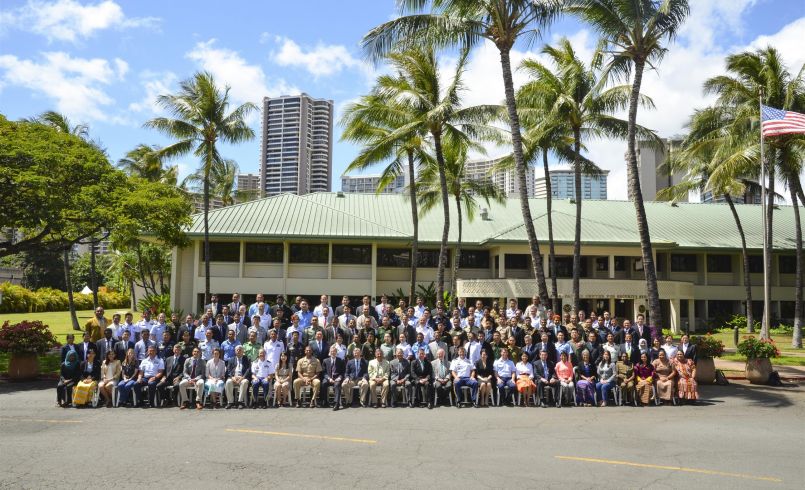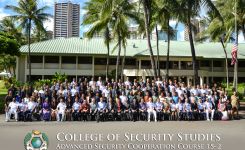- Daniel K. Inouye Asia-Pacific Center for Securi...
- U.S., international Fellows, complete security ...
U.S., international Fellows, complete security cooperation course
Gaining a deeper understanding of security issues within and far beyond their own nations’ borders, 120 Fellows from 33 locations completed the Advanced Security Cooperation course (ASC 16-1) Wednesday at the Daniel K. Inouye Asia-Pacific Center for Security Studies.
The five-week course is an executive education program enabling mid-level military and civilian leaders to deepen their understanding of security issues within political, socio-economic, defense and environmental contexts. The course’s primary intent, according to course manager Dr. Christopher Snedden, is to connect Fellows in a way that helps them collaborate on complex regional security challenges.
“They gain an understanding that cooperation is vitally important when considering security,” said Snedden, adding that Fellows’ ability to understanding perspectives other than their own is critical to building that cooperation. “Some Fellows come from large nations, such as China, India or the United States, and they face an entirely different set of security challenges than do the Kiribats, Tongans or Fijians. While Fellows’ own nations and sub-regions may be important, there are other nations and regions they need to know about.”
Thai Fellow Chotirat Komaradat related, “The world is getting smaller — interconnected — which means that an event in one country can have a spillover effect into another nation or into the entire region. In order to tackle (such) problems, you need advanced security cooperation.” Komaradat, with Thailand’s Ministry of Foreign Affairs, called it a true privilege to be able to learn from the perspectives and experiences from 120 other Fellows.
ASC 16-1 Fellows took part in a course comprised of a mix of lectures, interactive seminar sessions, electives, exercises and a Fellows Project. The course is divided into four modules that progress from an introduction to the region’s complexity and evaluation of strategic problem-solving tools to applying lessons learned in collaborative exercises.
Snedden spotlighted the content in Module 2, titled “Major Security Issues in the Asia-Pacific Region.” Among nine topics in this section, professors and Fellows discussed security challenges specific to major sub-regions, such as Oceania and Southeast Asia. Dr. Virginia Watson, for example, discussed the latter in terms of the need for cooperation on economic development and combating transnational threats, such as trafficking and terrorism.
Dr. Malik Mohan offered a bigger picture analysis in his brief “The Geo-political Landscape of the Asia-Pacific Region.” He led discussion on issues ranging from China’s dramatic resurgence as an economic and military power to the region’s present and developing alliances and power structures.
Discussions laid the groundwork for a capstone negotiation exercise focused on climate change impacts on a heavily populated, but underdeveloped river delta. Fellows played government and civil agency roles and had to overcome major differences in priorities to develop cooperative strategies for response actions and gain associated international aid.
“I’ve come away from this course knowing that even in an environment of intense competition, cooperation is still possible,” said Metho Dema, with
Bhutan’s Ministry of Foreign Affairs. Dema added that she learned if competing entities focus on common interests rather than on their positions, they can find “a big point of convergence,” making it easier to iron out differences — even over controversial issues.
Komaradat added, “I think APCSS lived up to its motto of educating, connecting and empowering, so I look forward to working with my classmates and APCSS alumni to change the world and make life better for everyone in the region.”
Komaradat and Dema were joined in ASC 16-1 by Fellows from Australia, Bangladesh, Cambodia, Canada, China, Fiji Islands, India, Indonesia, Kiribati, Laos, Malaysia, Maldives, Marshall Islands, Micronesia, Mongolia and Myanmar. Also participating were Fellows from Nepal, New Zealand, Pakistan, Palau, Papua New Guinea, Philippines, Republic of Korea, Samoa, Solomon Islands, Sri Lanka, Taiwan, and Timor-Leste. Other Fellows were from Tonga, the United States and Vietnam.
ASC is one of six formal courses at DKI APCSS. The center is a Department of Defense institute that addresses regional and global security issues. Military and civilian representatives, most from the United States and Asia-Pacific nations, participate in a comprehensive program of executive education, professional exchanges and outreach events, both in Hawaii and throughout the Asia-Pacific Region.
The Center supports U.S. Pacific Command by developing and sustaining relationships among security practitioners and national security establishments throughout the region. DKI APCSS’ mission is to build capacities and communities of interest by educating, connecting and empowering security practitioners to advance Asia-Pacific security. It is one of the Department of Defense’s five regional security studies centers.
Since opening in 1995, more than 10,000 alumni representing over 122 countries and territories have attended DKI APCSS courses and workshops.


